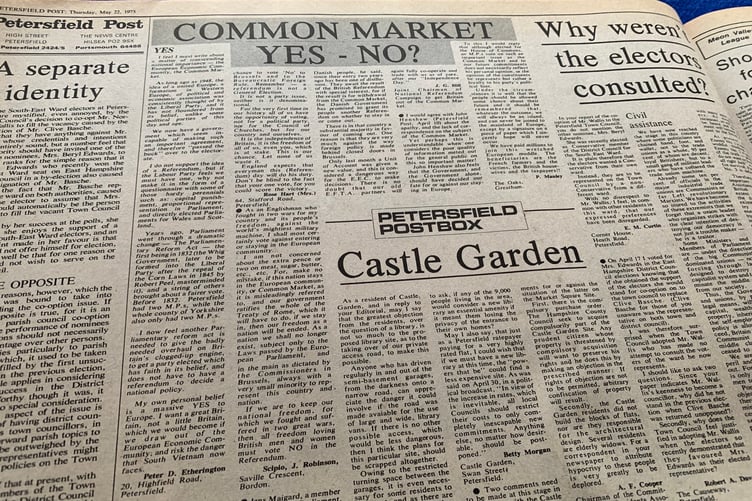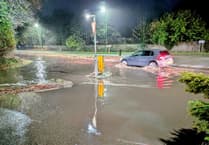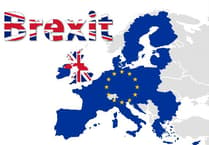Just when we thought we’d finally got over Brexit, it roared back into our lives this week, as Sir Keir Starmer announced a reset of relations with the European Union.
“This was the day the Brexit dream died,” thundered the Daily Mail. Meanwhile, Boris Johnson branded Sir Keir “the orange-ball chewing gimp of Brussels”.
All in all, it felt like a return to the febrile atmosphere of 2016 and the years that followed, as Brits slugged it out over the future relationship with mainland Europe.
Surprisingly, this isn’t a new phenomenon, as 50 years ago, the UK held its first referendum on whether to leave the European Economic Community (EEC), as the EU was then known.
In the run-up to the vote, on May 22, 1975 the Petersfield Post published a special letters page titled ‘Common Market: Yes or No?’ in which it heard from both Europhiles and proto-Brexiteers.

On the pro-European side was Peter Etherington of Highfield Road, Petersfield.
“As long ago as 1948, the idea of a united Europe, a formation in Western Europe of political and economic association, was consistently thought of by the Liberal Party, and it has not floundered from its belief, unlike some political parties of this day and age,” he wrote.
He added: “My own personal belief is a massive YES to Europe. I want a great Britain, not a little Britain, which we would become if we drew out of the EEC.”
Mr Etherington was in the minority among Post correspondents. His single pro-Europe letter was outnumbered five to one.
Mrs Rose Hart of Stafford Road, Petersfield, rallied the opposition with rhetoric that would make pro-Brexit MP Mark Francois proud.
“It was a very strong resistance movement that helped Great Britain and her partners win World War 2. Unfortunately, the British people forgot they had to work to maintain the peace,” she wrote.
“Though you may not know it, there is still a strong resistance movement in Britain today, which has been working very hard to free the British people from the foreign power that thought it could conquer Britain in two world wars.
“It is the independence of Britain, it is the freedom of us all, even you, which is at stake. This is our chance, let’s not waste it. England expects every man this Referendum day will do his duty. Don’t be blind to the fact that one vote, for you, could score a victory.”
Scipio J. Robinson of Saville Crescent, Bordon, took things even further.
“As an Englishman who fought in two world wars for my country and its people’s freedom, against the world’s mightiest military machine, I shall certainly vote against entering or staying in the European community,” he declared.
“Make no mistake, if this nation stays in the European community... then our freedom as a nation will be ended.
“If we are to keep our national freedom, for which we fought and suffered in two great wars, then all freedom-loving British men and women must vote NO in the Referendum.”
P. Manley of The Oaks, Greatham, chimed in: “We have paid millions to join this wretched European muddle. The beneficiaries are the French farmers and the victims: the British housewives and taxpayers!”
As usual, it was the Church of England that played the voice of moderation.
In his column, Canon R.H. Granger, Vicar of Petersfield, called for divine guidance.
“We pray thee, Father, that as our nation comes to make its great decision at the Referendum, that the minds of all may be enlightened to choose what will be best for Britain, for Europe and for all mankind,” he said.
In the end, our correspondents’ fiery warnings failed to rouse the passions of the British voters, and 67 percent opted to stay in the EEC. The debate was quietened—but not silenced—for a good few years.
We suspect, however, that a young Nigel Farage may well have been reading our letters page that week.





Comments
This article has no comments yet. Be the first to leave a comment.